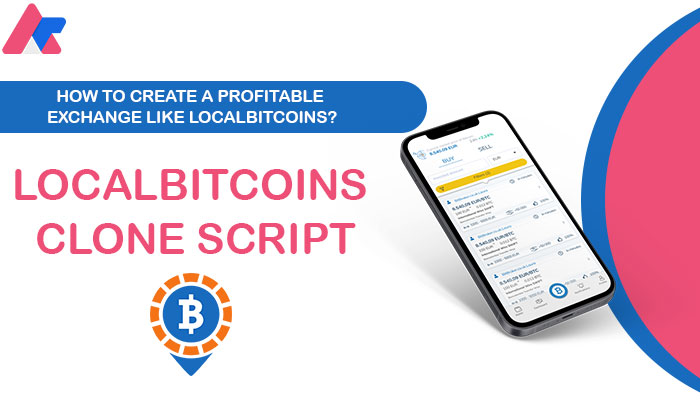Centralized Exchange vs Decentralized Exchnge: Which One Should you Develop?
A cryptocurrency exchange is the meeting place where traders can buy and sell their digital currency. These exchanges allow people to convert fiat money into cryptocurrencies like Bitcoin or Ether, and recent years have seen rapid growth in their popularity. So why not develop one and grow it as a successful business?
With the increasing number of new cryptocurrencies, new platforms will keep entering the market every now and then. This creates a golden opportunity for businessmen and investors who wish to make a profit by developing one of these platforms and competing with others. But it is important to not get confused between the different types of platforms that we will be discussing in this article.
Let’s start by breaking down both types of crypto exchanges along with their pros and cons to choose the best one in the end!
What is a Centralized Crypto Exchange?
A centralized crypto exchange is a digital marketplace where traders can buy and sell virtual coins. It’s the easiest way to get started with investing in cryptocurrencies, as beginners can easily open an account with no verification and start trading immediately.
They are typically the only choice for beginners looking to invest in crypto assets because of their widespread recognition and low barriers to entry. And centralized exchanges are necessary for efficient trading within the industry because they provide liquidity to the market and make it easier for new investors to gain more knowledge about crypto trading.
Popular Examples of Centralized Crypto Exchanges
- Binance
- Kraken
- Gemini
- Coinbase
How Does it Work?
A centralized exchange is successful if it’s profitable, expands its liquidity, and provides an easy-to-use platform for traders. Centralized exchanges must be audited and adhere to local regulations in order to work commercially around the world. Not to mention they are a type of financial institution that centralizes the buying and selling of a particular digital currency.
Trading volume on centralized exchanges usually grows over time as more traders join the network, which also increases their economic value proposition as companies may want to partner with them for marketing or development purposes based on increased trading volume.
Pros of Centralized Platforms
1. Variety of features
Decentralized exchanges lack advanced features like shorting, margin funding, and lending tools. They don’t have advanced order types either. Decentralized exchanges simply cannot compete with centralized exchanges when it comes to generating revenue for the exchange owner because they can’t attract big-name investors.
2. Beginner-friendly
The vast number of centralized exchange platforms provide an easy-to-learn user interface. Resulting in a hassle-free onboarding for new investors in the community. It allows new investors to put their money to work by making the process of buying/selling and trading cryptocurrencies with a few clicks.
3. Flexibility of funds
Decentralized exchanges offer their users a lot of control over funds. However, they’re not user-friendly and don’t have the liquidity or volume necessary to support trading large market cap coins (ie Bitcoin, Ethereum, Litecoin) — let alone small market cap crypto tokens. When a trader wants to buy a small market cap token, they have to go through the hassle of creating an account and manually sending funds to their wallet. With centralized exchanges, users can easily deposit funds into the exchange wallet and trade with anyone in the world.
4. Data security
From a security level perspective, centralization helps businesses by reducing the risk of security breaches that hackers can exploit. Their security level is high because of the way they handle their funds. Centralized exchanges are tightly regulated by governments around the world that set strict regulatory rules for a smooth trading experience. Decentralized exchanges, on the other hand, are completely unregulated and can be a more risky option in terms of security and efficiency.
Cons of Centralized Platforms
1. No ownership of cryptographic assets
The currency exchanges themselves control the buyer’s and seller’s funds during the process of trading on their platform. This simply means that the main owner doesn’t have custody of all the holdings in a portfolio when using a centralized crypto exchange. However, entrusting your funds to a well-known platform such as Binance won’t create any problems for sure.
2. Poor security systems can be a problem
There have been incidents of hacking and data breaches in the past when centralized crypto exchanges used to ignore the importance of their security systems. Fortunately, as a precautionary action, the majority of platforms are following the highest possible security practices in order to secure the funds and data at the moment.
3. Fee structure can be costly in some cases
These exchanges typically charge commissions for every trade made on their platform (typically 0.1-0.5% of each transaction). That means that the platform is taking a cut from each transaction, regardless of whether you’re buying or selling. Needless to say, choosing a platform with lower transaction fees can easily resolve this issue.
What is a Decentralized Crypto Exchange?
Centralized exchanges work like traditional stock exchanges in that they manage trades themselves. Whereas the decentralized ones use an intermediary-free protocol such as Ethereum with no single party telling participants what trades to make or curating prices making it unregulated. Hence, users trade with each other directly using an automated process known as smart contracts execution. This removes the need for a third-party service that facilitates the trade.
Examples of Decentralized Crypto Exchanges
- Crypto Bridge
- Pancake Swap
- Altcoin.io
- Uniswap
- Blocknet
Pros of Decentralized Platforms
1. Affordable trading fees
One of the most appealing aspects of decentralized exchanges is that they do not charge users any fees to use them. By avoiding the need for centralized servers and staff, decentralized exchanges are able to cut costs entirely. With no middlemen between traders and their money, users keep everything they make by taking part in trading.
2. Identity verification is not compulsory
Some centralized exchanges now ask for completing the KYC process before accessing all the features. And that is a step towards transparency as well because knowing who is responsible for which transaction can help out in many situations. But on decentralized exchanges, the users can stay completely anonymous while initiating orders with other traders.
3. Self-custodial behavior
With a decentralized exchange, individual users own their private keys, which means they are in total control of their assets. This is the ultimate scenario when one can fully hold and manage the assets themselves. Users only trade with other users directly and fund the account via different deposit methods supported on the respective platform.
Cons of Decentralized Platforms
1. Support for fiat currencies is missing
Fiat currencies act as the main medium of initiating any transactions during the process of crypto trading. And the same is not available on most of the decentralized exchanges at the moment. This makes it a lot harder for any beginner to step into the world of crypto trading. As he/she will need to hold another crypto first and later use it to trade with other currencies on the Dex.
2. No regulation over the transactions
Unlike centralized crypto exchanges, decentralized ones do not rely on any third party for the completion of orders. This means decentralized exchanges are not regulated by any center depository or owner. This can lead to unfair distribution of power if a voting system is present on the platform or encourage illegal circulation of assets via anonymous transactions.
3. Impermanent loss may occur
The possibility of accidentally sending tokens to an address that you do not intend to send them to. An example would be if you had set the default gas fee on MetaMask too low and then executed a transaction without checking, inadvertently sending all MET tokens to an address can lead to losing all your tokens as they have been sent to a similar address but on a different protocol.
Why is Choosing a Centralized Exchange Better in 2022?
It’s easy to assume that decentralized exchanges would be better than centralized exchanges. After all — no middleman means no one can censor your orders or freeze your account for disagreements about your identity. However, centralized exchanges still have benefits that aren’t readily apparent at first glance. Check out the following list of reasons why centralized exchanges have a leg up on decentralized exchanges.
- They offer competitive trading and execution fees.
- More convenient for users than decentralized exchanges as they do not require high-level understanding.
- They provide liquidity to low-volume cryptocurrencies which balances the market flow.
- Offering a very secure platform to the investors, the process of trading crypto becomes much safer.
- They can offer more advanced trading tools for price estimation and market analysis.
- Unlike decentralized platforms, people don’t have to wait for several minutes [sometimes hours] before their order is executed to make a transaction on a centralized exchange.
- DDOS protection on centralized exchanges offers better protection against cyber-attacks.
Conclusion
Centralized exchanges are technologically superior to decentralized exchanges. They have high speed, low latency, and high-volume trading capabilities that decentralized exchanges lack. For instance, If someone is looking to execute large trades at a low cost, using platforms like Binance or ByBit will offer a 100 times faster execution of the transaction.
Therefore, if you have decided to develop a crypto exchange platform in 2022 and are ready to jump into the competition, then developing a centralized exchange is a wise choice. Because understanding how decentralized platforms work and expecting normal users to learn it can result in a failure as a business. On the contrary, centralized exchanges are easy to use and develop as well!
Zahir Khan
Zahir is the Head of Digital Marketing at Appinop Technologies with expertise in blockchain content writing and designing. He loves to read and write about new technologies like Blockchain, Web 3.0, Meta-verse, etc. In his spare time, he enjoys watching reels of cats and dogs.






